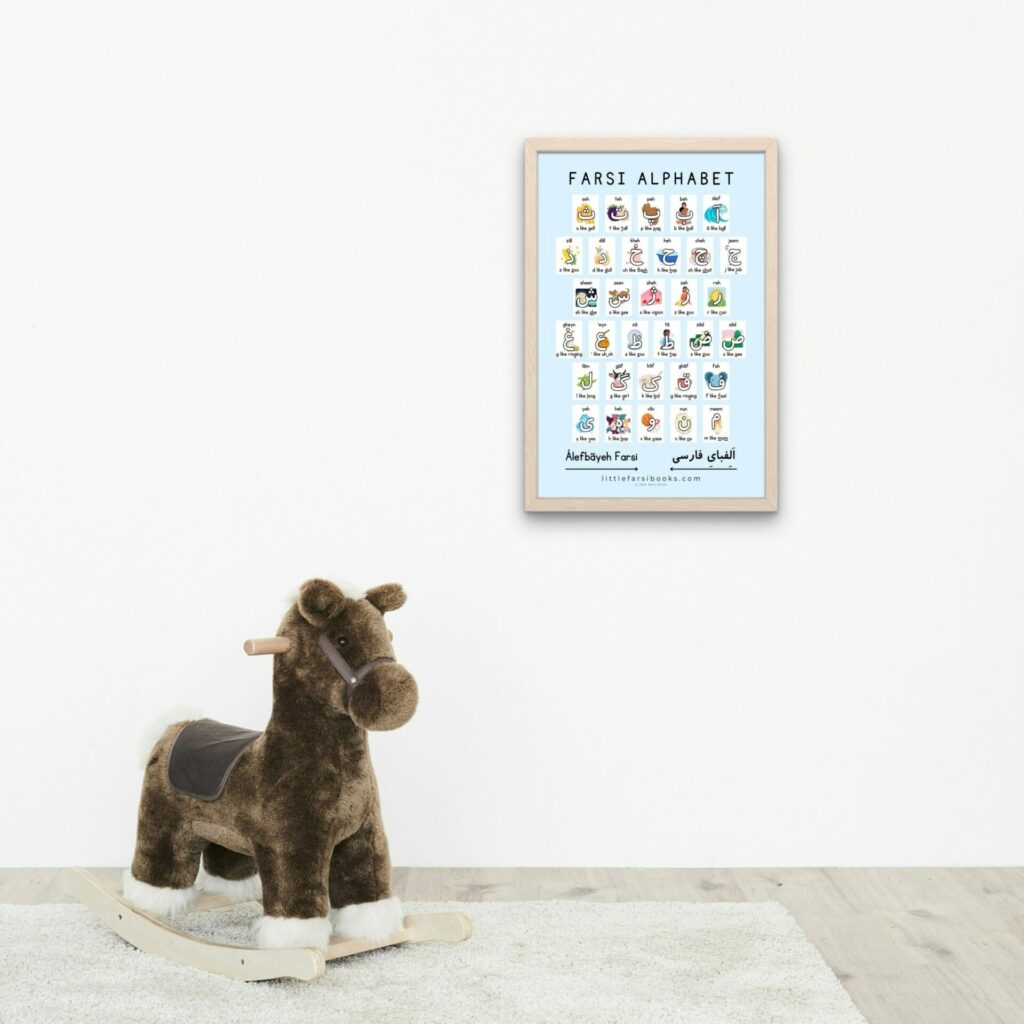Easy Farsi Learning
فارسی بَرایِ بَچِه ها (و بُزُرگسالانِ آنها) : عِباراتِ فَرمایِشیِ فارسی
Farsi bárāyeh bácheha (va bozorgsālān-eh-ānhā): ebāret-eh fármāyeshee-yeh Farsi
If you purchase products or books I recommend from Bookshop.org after clicking on the links in this post, I might receive a commission of 10% of the purchase price. The commissions help fund the cost of hosting this website. I also link to other retailers that do not give me a commission. I only recommend items that I personally love. I always thoroughly research products and books before recommending to make sure they are high quality and relevant to my readers. Read more in my Privacy Policy and Disclosures.
Easy Farsi for Toddlers (And Their Grown Ups)

We tell our toddler to “beeya” a lot, but she tells us to “beeya” even more!
Every parent uses a lot of imperative phrases, otherwise known as commands or requests. To form a command in Farsi, take the present tense stem of the verb and add the imperative prefix “بِ | be” (e sounds like the e in ‘egg’) to the beginning, like this:
| Verb – English | Verb – Farsi | Present Tense Stem | + Imperative Prefix | = Imperative Verb | English Translation |
|---|---|---|---|---|---|
| to jump/fly | پَریدَن | páreedán | پَر | pár | بِ | be (e like in ‘egg’) | بِپَر | bepár | Jump! |
See this video as an example using the verb “to come.” We tell our toddler to “beeya” a lot, but she tells us to “beeya” even more!
Want to take a deep dive into imperative Farsi verbs and grammar? Check out this guide from the University of Texas at Austin, or this one from Ali Jahanshiri. And also don’t feel bad if you have zero interest in a deep dive and just want to pick up the few easy Farsi phrases I’ve included below. Your interests (or lack thereof) are valid. If you need someone to remind you of that, hit me up and I’ll send you all the encouraging words. 🙂
Now let’s learn some easy Farsi words and phrases you can start using today in everyday interactions with your family.
Let’s Learn: Easy Farsi Imperative Phrases with Farsi Script, Transliterations, and Translations
In the charts below, I’ve only included the informal versions of these phrases. I have also used the informal contractions (short versions) of the phrases. In formal Farsi, and especially in written Farsi, some of the words are pronounced and/or written differently.
All that to say, if you’re talking to an elder and you need to be extra respectful and formal, you probably don’t want to rely on these phrases! Could you imagine telling Khaleh to “listen | gush bedeh | گوش بِدِه”? 😳
Check out this great lesson from Chai and Conversation for more info about the difference between the formal ‘shomā | شُما’ and the informal ‘to | تو.’
Easy Farsi Charts
Vowel Pronunciation Guide
| Vowel | Transliteration | Sound |
|---|---|---|
| ا ,آ | ā | a in “all” |
| و | u | u in “rule” |
| َ (slanted line above) | á | a in “ran” |
| ِ (slanted line below) | e | e in “egg” |
| ُ (looped line above) | o | o in “oh” |
| ی, | ee | ee in “feel” |

Free Download: Farsi Alphabet Poster (Alefbaye Farsi اَلِفبایِ فارسی)
simple verbs: beh + present tense verb stem
In general, regular verbs are made imperative by taking the present tense verb stem and adding “beh | بِ” to the beginning. Some regional pronunciation differences might change this in some dialects or accents. Remember that ‘e’ in these transliterations always sounds like the ‘e’ in ‘egg,’ while ‘ee’ sounds like ‘ee’ in ‘feel.’ See the vowel pronunciation guide above for more.
| Farsi | Transliteration | Translation |
|---|---|---|
| بِبین | bebeen | look |
| بِشین | besheen | sit down |
| بِدِه … | … bedeh | give … |
| گوش بِدی | gush bedeh (gush: u like in ‘rule’) | listen (literally: give ear) |
| دَستِتو بِدِه بِه مَن | dást-e-to bedeh beh mán | give me your hand |
| بوس بِدِه بِه مَن | bus bedeh beh mán (bus rhymes with goose) | give me a kiss |
| …بِگو | begu… | say… |
| بِگو لُتفَن | begu lotfán | say please |
pronunciation differences: bo and bee
If the verb stem has an “oh” sound in the first syllable, then the the “beh | بِ” becomes “bo | بُ” in spoken language, simply because human brains like matching sounds and that’s how language evolves sometimes. 🤷♀️ In written Farsi, you would leave off all the vowel diacritics/markings anyway, so if you write these phrases down, leave off the diacritic off of the letter b | ب entirely.
Similarly, if the verb stem starts with “ā” then the letter “yeh | ی” is added before the letter “álef | آ” and the ‘eh’ sound becomes an ‘ee’ sound. A ‘y’ sound sneaks in there to make it flow nicely as well.
Remember that ‘o’ in these transliterations always sounds like ‘oh’ and rhymes with ‘no.’ See the vowel pronunciation guide above for more.
| Farsi | Transliteration | Translation |
|---|---|---|
| بُدو | bodo | run (also used colloquially to say ‘hurry’) |
| بُرو | boro | go (also used colloquially to say ‘get out of here’) |
| بُرو اونجا | boro unja | go there |
| بُخور | bokhor | eat |
| بیا | beeyā | come |
| بیا اینجا | beeyā eenjā | come here |
exceptions for compound verbs: present tense verb stem by itself
Some verbs are only used in partnership with another word as compound verbs like the ones listed above, and these verbs are made imperative by using the present tense stem, without any prefix or suffix, after the partner word.
| Farsi | Transliteration | Translation |
|---|---|---|
| شو … | … show | become… |
| بُلَند شو | bolánd show | stand up (literally: become tall) |
| باش … | … bāsh | be … |
| مُلّایِم باش | mollāyem bāsh | be gentle |
| ساکِت باش | sāket bāsh | be quiet |
| …کُن | … kon (sounds like ‘cone’) | do … |
| صَبر کُن | sábr kon^ | wait/be patient (literally: do waiting/patience) |
| لالا کُن | lālā kon* | sleep (literally: do sleeping) |
* ‘lālā’ is a Toddler Farsi word for sleep, the real phrase would be “bekhāb | بِخواب” (the و | vav is silent in my pronunciation but some dialects pronounce it as ‘u’ or ‘w’ in this word)
don’t: nah + present tense verb stem
| Farsi | Transliteration | Translation |
|---|---|---|
| اونو نَخور* | oono nákhor | don’t eat that |
What Farsi phrases do you think are most useful for parents and families to learn?
I hope these phrases help you bring Farsi into your family life! What phrases or words do you think parents and families would find useful? Send me an email (maia@littlefarsibooks.com) or contact me with this form!
